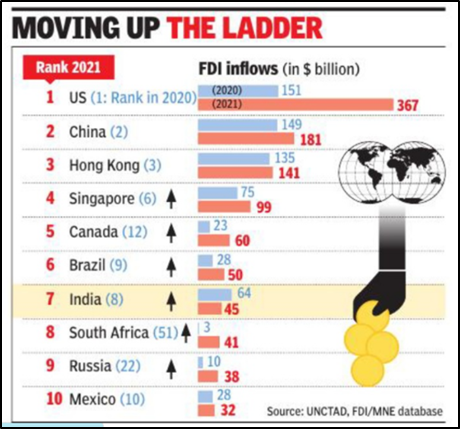In News:
- India’s rank jumped one notch to 7th position among top recipients of foreign direct investment (FDI) in the 2021 calendar year, according to the United Nations Conference on Trade and Development (UNCTAD).

What’s in today’s article:
- UNCTAD (Objectives, Functions, Reports, etc.)
- FDI (Meaning, Difference between FDI and FII)
- News Summary (World Investment Report highlights)
United nations Conference on Trade & Development (UNCTAD)
- UNCTAD is a permanent inter-governmental body established by the United Nations General Assembly in 1964.
- It is responsible for dealing with development issues, particularly international trade.
- Framing policies in various domains such as trade, technology, finance, aid, and transport are the most important priorities of UNCTAD.
- The Conference ordinarily meets once in four years.
- The second UNCTAD Conference took place in New Delhi, India in 1968.
- Members: 195 countries
- Headquarters: Geneva, Switzerland
Objectives of UNCTAD:
- UNCTAD, with its work in the national and global levels, aims to help countries to:
- Understand options to address macro-level development challenges.
- Acquire beneficial integration into the international trading system.
- Reduce the dependency on commodities by diversifying the economies.
- Decrease their exposure to debt and financial volatility.
- Increase development-friendliness by attracting more investments.
Reports Published by UNCTAD:
- Trade and Development Report
- Trade and Environment Review
- World Investment Report
- Least Developed Countries Report
Foreign direct investment (FDI)
- Foreign direct investment (FDI) is an investment from a party in one country into a business or corporation in another country with the intention of establishing a lasting interest.
- With FDI, foreign companies are directly involved with day-to-day operations in the other country.
Difference between FDI and FII:
- FDI or Foreign Direct Investment is an investment that a parent company makes in a foreign country.
- On the contrary, FII or Foreign Institutional Investor is an investment made by an investor in the markets of a foreign nation.
- In FII, the companies only need to get registered in the stock exchange to make investments.
- The Foreign Institutional Investor is also known as hot money as the investors have the liberty to sell it and take it back.
- But in Foreign Direct Investment, this is not possible.
- In simple words, FII can enter the stock market easily and also withdraw from it easily.
- But FDI cannot enter and exit that easily.
- This difference is what makes nations to choose FDI’s more than then FIIs.
- In 2013, a four-member committee headed by Arvind Mayaram was constituted for giving clear definitions to FDI and FII with an aim to remove ambiguity over the two types of foreign investments.
How does FDI enter in India?
- Foreign Investment in India is governed by the FDI policy announced by the Government of India and the provisions of the Foreign Exchange Management Act (FEMA), 1999.
- FDI enters in India through either of the two routes:
- Automatic route
- Government-approval route
- Automatic route:
- The non-resident or Indian company does not require prior nod of the RBI or government of India for FDI.
- Government route:
- The government's approval is mandatory.
- The company will have to file an application through Foreign Investment Facilitation Portal, which facilitates single-window clearance.
- The application is then forwarded to the respective ministry, which will approve/reject the application in consultation with the Department for Promotion of Industry and Internal Trade (DPIIT), Ministry of Commerce.
- DPIIT will issue the Standard Operating Procedure (SOP) for processing of applications under the existing FDI policy.
Sectors in which FDI is prohibited:
- There are a few industries where FDI is strictly prohibited under any route. These industries are:
- Atomic Energy Generation
- Any Gambling or Betting businesses
- Lotteries (online, private, government, etc.)
- Investment in Chit Funds
- Nidhi Company
- Agricultural or Plantation Activities (although there are many exceptions like horticulture, fisheries, tea plantations, Pisciculture, animal husbandry, etc.)
- Housing and Real Estate (except townships, commercial projects, etc.)
- Trading in TDR's
- Cigars, Cigarettes, or any related tobacco industry
News Summary:
- Despite FDI inflows in the country declining, India’s rank jumped one notch to 7th position among top recipients of foreign direct investment (FDI) in the 2021 calendar year, according to UNCTAD’s latest World Investment Report.
Major Highlights of the Report:
- The World Investment Report focuses on trends in foreign direct investment (FDI) worldwide, at the regional and country levels and emerging measures to improve its contribution to development.
- As per the latest report, top 3 FDI destinations in the world are:
- United States ($367 billion),
- China ($181 billion) and
- Hong Kong ($141 billion)
- UNCTAD said global FDI flows recovered to pre-pandemic levels in 2021, growing 64 per cent to $1.6 trillion.
- UNCTAD foresees that the growth momentum of 2021 cannot be sustained and that global FDI flows in 2022 will likely move on a downward trajectory, at best remaining flat.
India’s Scenario:
- Among the top 10 host economies for FDI, only India saw a decline in its FDI inflows.
- FDI inflows to India declined to $45 billion in 2021 from $64 billion in 2020.









